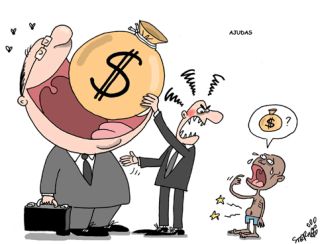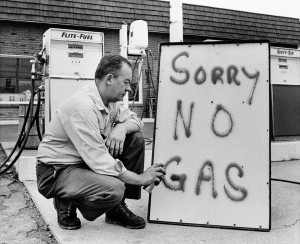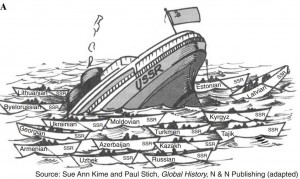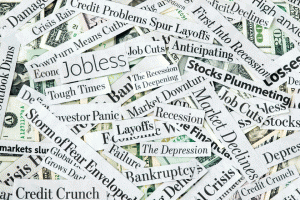
Top 10 Biggest Economic Disasters the World has Seen
It is said that the economy of a country keeps it moving. There have been quite a lot of examples in the history of the world that have shown that an economy ill-maintained has led the country to crumble ans asked for desperate measures by the goverment of that country and now that globalisation has set in world-wide, a slight downturn in the economy of one country leads to ripple effects incountries continents afar. International organizations like the World Bank and the IMF have often come to the aid of weaker economies to provide a solution before it was too late. Here are some of the worst economic hits that countries around the world have faced over time.
10.Asian Financial Crisis

It was a financial crisis that gripped a better part of east Asian countries in 1997. It started at Thailand with the collapse of Thai Baht and spraed to other countries. The countries worst hit were South Korea, Thailand and Indonesia. The IMF initiated a $40 billion program to stabilise the currencies of above stated countries.
9.OPEC Oil Price Shock

As result of US and western Europe’s support of Israel in the Yom Kippur War, 1973, OPEC declared an oil embargo which led to the rise of prices of oil from $3/barrel to $12/barrel. This marked the start of gas rationaing and a sharp rise in prices lead to panic reaction in the consumers. Ultimately, the US dollar devalued. Inflation rose steeply in the US, as did unemployment.
8. Subprime Mortgage Crisis

It was a banking emergency in the US which was accompanied by the Recession of 2007-2008. The cause of the crisis is said to be the increase in sub-prime lending. A large part of the mortgages were adjustable-rate mortgages and left the common US household increasingly indebted and very low disposable personal incomes. A large number of financial institutions collapsed resulting into the onset of global recession.
7.Russian Financial Crisis

The Russian Financial crisis , also called the Ruble crisis hit Russia on August 17, 1998. It caused the Russian Government to devalue its currency, Ruble and to default on its debt. The reasons which led to the crisis are many including a chronic fiscal deficit, declining productivity and a fixed exchange rate between Ruble and foreign currency. The decline in prices of crude oil and no-ferrous metals caused to to the Asian financial crisis of 1997 led to the depletion of Russian foreign exchange reserves.the sudden increase in demand and prices of oil in 1999-2000 helped Russia to recover soon enough. The recovery was aided by the improved production processes in the country as well.
6.Collapse of Soviet Communism

Soviet Union , which was concieved to be the most stable political units in the 1970s- 1980s collapsed into 15 countries in 1991. The economy had a large part to play. The economy of the Soviet union was based on 5 year plans and depended on agrarian profits a lot. It was characterised by a period of stagflation. Soveit agriculture had stagflated in the 1980s but the demand for grains was ever rising which made it necesaary to buy it from the international market. For this, it was necessary to borrow from the Western banks contributing to a weaker economy.
5.Hyper Inflation in the Weimar Republic

It was a three year period of hyperinflation in present-day Germany from 1921 to 1924. It all started with the signing of the traety of Versailles which subjected the country to pay off its debt in cash or kind to the equivalent of 2 billion gold marks every year. In 1921, Germany somehow managed to pay its first installment but after that, the economy crumbled. German government attempted to buy foreign currency with German currency, the resulting increase in the supply of German marks on the market caused the German Mark to fall rapidly in value, which greatly increased the number of Marks needed to buy more foreign currency. This caused German prices of goods to rise rapidly, increasing the cost of operating the German government.
4.Argentine Economic Crisis

This economic disaster which started because of the Russian and Brazilian Financial crisis resulted in the worst economic scenario for Argentina resulting in low unemployment rates, fall og the government, riots and defaulting of the country’s foreign debt. The crisis which lasted from 1998 to 2002 saw its population sink to below poverty line to the extent of 57.4% in 2002. The causes of the crisis are often assumed to be inappropriate fiscal policy, political turmoil, a considerable adverse external shock and wage and price rigidities inconsistent with a fixed excange regime.
3. Eurozone Crisis

The Eurozone crisis or the Sovereign debt crisis started as a by product of the Great Recession aropund 2009 and has been going on in a few eurozone member states ever since. The governments faced high structural deficits and ever increasing debt levels and increasing rates of interests for government bonds. The crisis caused the IMF and European Commision with the help of European Central Bank to bailout four eurozone states.
2. Global Financial Crisis

The Economic Crisis of 2007-2008 was considered to be the worst economic disaster by many econonists around the world after the Great Depression. The global impact of the crisis was such that it threatened to collapse large financial institutions which was prevented by the bailout of banks by their respective governments. The global financial crisis started around 2007 preceded by the liquidity crisis when BNP Paribas terminated withdrawals from three hedge funds citing a complete evaporation of liquidity.
1.The Great Depression

This worldwide economic downturn happened in the pre- World War II era, starting from 1929 and lasting to around 1939. It was the most wide spread depression of the 20th century. Its devastating effects did no difference between the rich and the poor countries. The origin of the Great Depression lies in the US , though all the countries around the world suffered the whiplash resulting in all time lows in international trade, employment rates, profits and personal incomes.
